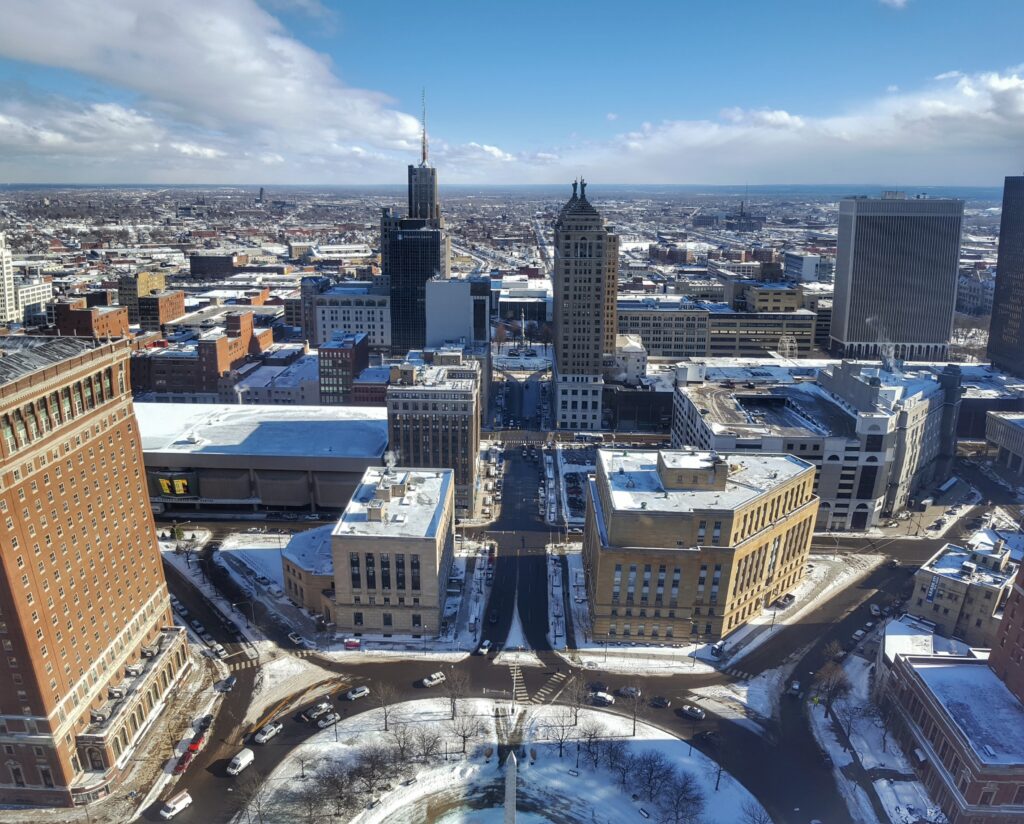By Melanie Jamileh Prasad, JMA Legal Director
I was born and raised in Buffalo, New York and want to share some thoughts about the shooting there this weekend. I carry a strong attachment and deep feeling of home to my city. My “Buffalove,” as we call it, runs so deep I have driven everyone at Jobs to Move America crazy with stories of how amazing my city is—from the food, to the architecture, to the people. As it happens, I was home this weekend for my sister’s bridal shower when the shooting occurred.
Buffalo, like many metropolitan cities in the U.S., is a deeply segregated city. The shooting occurred on Buffalo’s East Side, where about 85% of Buffalo’s Black residents live—thanks to a century’s worth of restrictive covenants, redlining, and racist urban planning. And despite Buffalo’s renaissance over the past decade, the East Side remains an incredibly impoverished and neglected part of our city.
The Tops on Jefferson is particularly important because it is the only grocery store in what has been a food desert for decades. The luxury of having accessible grocery stores is something all of us take for granted. With the closure of the Tops after the shooting, the community–many of whom do not have access to a car–is now left without access to fresh food and produce.
The second I heard “Tops on Jefferson Ave,” the first words out of my mouth were: “I bet it was some Trump-loving, young, white guy.” And sure enough, that was true. As we kept reading the news, I was predicting the next lines before they were read. “He probably spent too much time on 4chan.” “He probably wrote about it a lot.” “He’s probably from a rural, poor white area.” And those were all true. As I kept predicting the next lines of the article, I grew more and more angry. Why is it that the same horrific stories keep happening over, and over, and over again, and we do nothing about it?

Thanks to Trump legitimizing racist ideologies that had previously only been espoused in hushed voices or the darkest depths of the internet, white supremacists have become emboldened, finding community in online echo chambers that reinforce and further radicalize their beliefs. Time and time again, we have seen the same stories play out where the continued reinforcement of these ideologies has escalated to hate crimes across the U.S. As of 2020, hate crimes had risen in America by 42% since 2014. So why is it that we continue to bury our heads in the sand and allow Black and brown communities across the U.S. to live in a perpetual cycle of fear and trauma?
As a Middle Easterner who grew up during 9/11, our apathy towards domestic terrorism enrages me. For years after the Twin Towers fell, Middle Easterners, Sikhs, Indians, and other ethnic groups vaguely resembling Middle Easterners were targeted both by everyday people and by law enforcement. At age 10, my newly emigrated cousins were harassed at school so much that the “cool aunt” in my family frequently wrote them notes to get out of class, to give them some peace. At age 13, I vividly remember hiding the tears streaming down my face behind a book, my heart racing, as a border official interrogated my mom, telling her to “go back to home.” At age 15, my dad was “randomly selected” to be searched, at all three connections of the same trip. And yet, we all tacitly allowed my community to be the subject of increased scrutiny, because of the actions that occurred on a single day in our country’s history.
Given the incredibly predictable pattern of these increasingly frequent mass shootings, why do we continue to allow domestic terrorists a free pass? Why do we continue to mollycoddle the young, white men who commit these mass shootings, excusing their actions under the guise of “mental health issues”? Why was someone who had been investigated for saying he wanted to commit a murder suicide allowed to legally purchase a semiautomatic rifle? Why do we continue to ignore websites like 4chan and 8chan where terrorists post how-to’s on committing mass shootings and describe their plans in detail? These terrorists aren’t hiding in the mountains in far reaching places: they’re our classmates, our coworkers, and our neighbors. They don’t whisper their plans in secret meetings, they readily post their meticulous plans on the internet for everyone to see. We know who they are and we know where they are. All we’re waiting for is for someone in power to care.
At JMA, we work tirelessly to advance racial justice and equity in and out of the workplace. Many of us are people of color, women, and LGBTQ+ identified. We’re doing our part. It’s time for our lawmakers, the vast majority of whom are white men, to step it up.
My heart hurts for my community, my city, my home, but it also hurts for Black folks everywhere who live every day under the crushing weight of constant fear and trauma, and the knowledge that this country continues to turn a blind eye against the systemic violence being perpetrated against their communities. This story is in no way unique. It is not the first racially motivated mass shooting and it will certainly not be the last. Until lawmakers actually acknowledge and act on the domestic terrorism endemic, the overwhelming grief my city has endured will be boiled down to a single bullet point on a list of mass shootings–past, present, and future.
Rest in power, Roberta A. Drury, Margus D. Morrison, Andre Mackneil, Aaron Salter, Geraldine Talley, Celestine Chaney, Heyward Patterson, Katherine Massey, Pearl Young, and Ruth Whitfield.
If you want to help the community or need access to community resources, this document has a comprehensive list.
